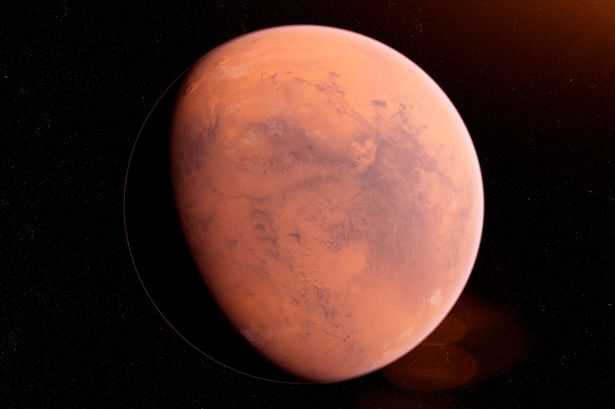Science
NASA Unveils Strongest Evidence of Life on Mars from Perseverance

NASA has made a significant announcement regarding the potential for life on Mars, revealing what it describes as the “clearest sign of life” ever found on the planet. The discovery stems from a rock sample collected by the Perseverance rover, which is currently exploring the Martian surface. This sample, named “Sapphire Canyon,” was retrieved in July 2022 from rocky outcrops located at the edges of Neretva Vallis, a river valley shaped by ancient water flow into Jezero Crater.
In a presentation held on Wednesday, NASA officials shared details about this groundbreaking finding. According to Dean Duffy, the new NASA administrator, the discovery represents the strongest evidence to date that Mars may have once supported life. Since landing on Mars in February 2021, the Perseverance rover has been conducting a detailed exploration of Jezero Crater, an area that was once home to a large lake.
The rover’s mission includes collecting core samples from Martian rock and regolith, with the aim of returning these materials to Earth for further analysis. Of the 43 tubes taken to Mars, 38 were designated for sampling, while the remaining five served as “witness tubes,” designed to ensure the cleanliness of the sampling system throughout the mission. NASA emphasized that the Mars 2020 Perseverance Rover aims to search for signs of ancient microbial life, contributing to the understanding of Mars’ past habitability.
Significant Findings and Peer-Review Process
The rover has been transmitting images back to Earth, showcasing crystalline formations left by water that once flowed across Mars’ surface. During the recent presentation, scientists reported that the discovery of possible life signs on Mars marks the culmination of over three decades of research. The findings underwent a thorough peer-review process, which confirmed that the samples likely have a biological origin.
One of the key figures involved in the research, scientist Joel Hurowitz, pointed out that subtle chemical signatures found within the crater indicate a potential for life billions of years ago. Professor Sanjeev Gupta, a planetary scientist from Imperial College London and co-author of a study published in the journal Nature, commented on the significance of the findings. He stated, “We’ve not had something like this before, so I think that’s the big deal. We have found features in the rocks that, if you saw them on Earth, could be explained by biology—by microbial processes. So we’re not saying that we found life, but we’re saying that it really gives us something to chase.”
As NASA continues to analyze the data and samples collected by the Perseverance rover, the scientific community eagerly anticipates further insights into Mars’ history and its capacity to have supported life. This discovery not only enhances our understanding of the Martian environment but also fuels the ongoing quest to explore the possibility of life beyond Earth.
-

 Entertainment2 months ago
Entertainment2 months agoIconic 90s TV Show House Hits Market for £1.1 Million
-

 Lifestyle4 months ago
Lifestyle4 months agoMilk Bank Urges Mothers to Donate for Premature Babies’ Health
-

 Sports3 months ago
Sports3 months agoAlessia Russo Signs Long-Term Deal with Arsenal Ahead of WSL Season
-

 Lifestyle4 months ago
Lifestyle4 months agoShoppers Flock to Discounted Neck Pillow on Amazon for Travel Comfort
-

 Politics4 months ago
Politics4 months agoMuseums Body Critiques EHRC Proposals on Gender Facilities
-

 Business4 months ago
Business4 months agoTrump Visits Europe: Business, Politics, or Leisure?
-

 Lifestyle4 months ago
Lifestyle4 months agoJapanese Teen Sorato Shimizu Breaks U18 100m Record in 10 Seconds
-

 Politics4 months ago
Politics4 months agoCouple Shares Inspiring Love Story Defying Height Stereotypes
-

 World4 months ago
World4 months agoAnglian Water Raises Concerns Over Proposed AI Data Centre
-

 Sports4 months ago
Sports4 months agoBournemouth Dominates Everton with 3-0 Victory in Premier League Summer Series
-

 World4 months ago
World4 months agoWreckage of Missing Russian Passenger Plane Discovered in Flames
-

 Lifestyle4 months ago
Lifestyle4 months agoShoppers Rave About Roman’s £42 Midi Dress, Calling It ‘Elegant’









